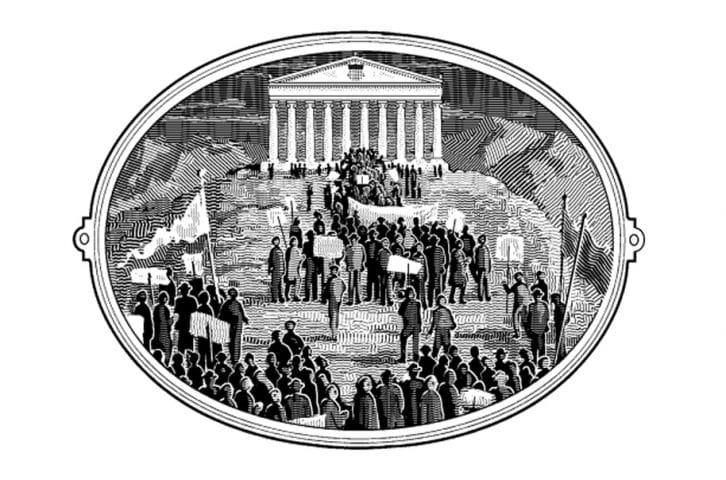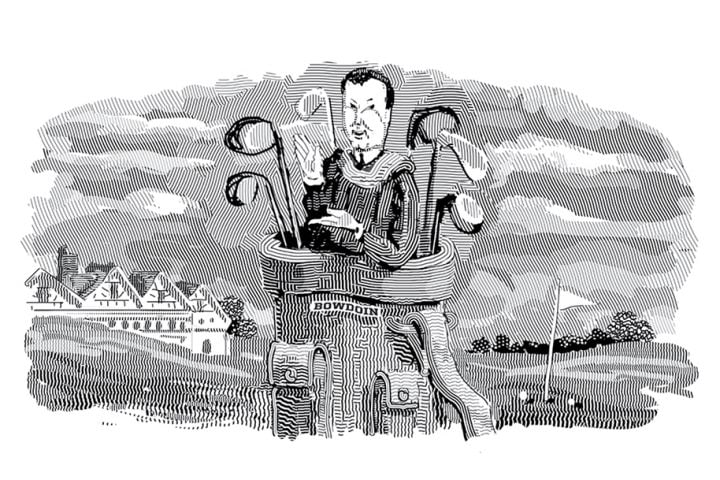Books Reviewed
A review of The Language of Law and the Foundations of American Constitutionalism , by Gary L. McDowell
, by Gary L. McDowell
America has found its Thomas Hobbes for the 21st century. In The Language of Law and the Foundations of American Constitutionalism, Gary McDowell offers one of the most significant scholarly arguments ever written for legal positivism as a guarantor of political liberty, recurring time and again to Hobbes in this magisterial survey of constitutional originalism. It was Hobbes who brought law down from the clouds and showed it to be the plain, intelligible will of the sovereign—ultimately, the sovereign people. It is to this popular will that contemporary jurists must look if they are honestly to interpret the Constitution, writes McDowell, and in so doing to preserve political liberty in the face of its archenemy: arbitrariness. Justice is the interest of the properly constituted majority.
A professor at the University of Richmond's Jepson School of Leadership Studies, McDowell begins by reminding the reader of the remarkable thing that happened nearly a quarter of a century ago when the U.S. Senate refused to confirm Robert Bork's nomination to the Supreme Court. Bork was rejected not on account of his qualifications, ability, or integrity, but because of his judicial philosophy—a version of the philosophy of originalism that had been at the core of the Anglo-American legal tradition for centuries. Nothing less than a new theory of judging was being put forth by Bork's detractors. Indeed, prior to the 1980s, there were few if any open arguments against originalism, which was taken to be the sine qua non of legal interpretation.
To engage in reasoning about what the law requires is first and foremost to determine meaning, and meaning in turn depends on what words meant when they were promulgated, not on what judges—whose constitutional authority derives from the very instrument they purport to construe—might wish them to mean. McDowell's central claim is undoubtedly correct: "Recourse to original intention—John Marshall's ‘most sacred rule of interpretation'—is the true mainstream flowing from the well-established legal and constitutional traditions of the nation." For Marshall, determining the "mind of the Convention" was critical to constitutional interpretation, and to constraining judges to their proper role.
McDowell ably identifies the spurious scientism from which modern American legal education was born, and the fanciful and expansive conceptions of judicial power that grew from it. Christopher Columbus Langdell's case method at Harvard Law School, Woodrow Wilson's Darwinian science of politics, and Edward S. Corwin's melding of the two at Princeton each contributed to the idea that judges are key actors in the ceaseless, evolutionary unfolding of law away from the founders' purportedly primitive intentions.
* * *
By contrast, the founders' originalism, in McDowell's account, was born of early modern political thought, particularly that of Hobbes. It was Hobbes who supplanted the great tradition of legal interpretation in the West, and rested it on the low but solid foundations of positivism. He allows us to conceive of fundamental or "higher" law that is not divine, and whose meaning is therefore not shrouded in the byzantine meanderings of the medieval schoolmen, or of common- law jurists such as Sir Edward Coke. In claiming that law is the command of the sovereign rather than the dictate of wisdom or right reason, Hobbes cleared the field for government by the people, no longer bound by the chains of monkish ignorance and superstition. Written law comes to supplant claims about God, nature, and custom, and legal interpretation is properly subordinated to law creation and promulgation—and to the entirely reasonable view that words used in legal documents are intended to convey certain fixed ideas from the mind of the writer to that of the reader.
McDowell claims that John Locke merely tamed Hobbes (without fundamentally modifying his teaching) by "drawing a necessary line between the sovereign and the government," thereby ensuring that the people "never cede their sovereignty in the process of entering into the social contract." According to McDowell, Locke, like Hobbes, denied that there are innate principles of right and wrong, and both drew out the necessary conclusion from William of Ockham's nominalism: We can know only the particulars, not the essences, or natures and purposes of things. Human beings are thus left free to create their own meanings, and to express these meanings in law. "The power of man to live according to his own will" is McDowell's understanding of Lockean freedom, and one that he endorses.
The author traces these developments in the idea of law with impressive attention to detail. But the book is not an easy read. It does not proceed strictly chronologically, and it alternates rapidly between political theory and jurisprudence, social contract and originalism, philosopher and judge, politician and scholar. Major figures and lesser lights each take their turn. And yet McDowell sometimes glosses over important matters. For example, like many conservatives, he is quick to suggest that the shift away from text and intention toward a living constitution is "not a matter of ideology," and that there's not much difference between the liberal judicial activism of today and the conservative activism of a century or more ago. But conservatives—though never perfect or perfectly consistent in matters of constitutional interpretation—never conceived jurisprudence as an adjunct of the powerful philosophy of history that has undergirded progressive constitutionalism since its birth in the late 19th century. Although they might have differed over original meanings, conservatives never suggested that such meanings might be ignored when hard cases demanded an accommodation with evolutionary social and political forces. In this sense, conservatives have been far less consistent, and far less dangerous to the founders' Constitution, than liberals.
Following William Blackstone, McDowell's default position is that law without equity is better than equity without law. But try telling that to anyone on the receiving end of a civil servant's officiousness and you will get many common-sense reasons why the strict application of positive law is, to put it mildly, problematic. That justice must be tempered by mercy—a mercy arising from proper reasoning about the nature of the whole—seems as essential an element of the workings of a constitutional republic as it does of Christian faith. And demand for such proper reasoning is as likely to be stimulated by a love of truth as mercy. One need not embrace what McDowell abhors—"moralistic judging rooted in a so-called ‘living' constitution"—in order to claim that constitutionalism requires moral reasoning. It is hard to disagree with McDowell's claim that it is politically prudent to distrust the moral impulses of judges. But it is not politically prudent to deny moral realism in the name of prudence.
* * *
Must constitutional originalism really exclude any "higher law" not committed to the parchment of the document? The book's epigraph is a quotation from Justice Benjamin Curtis's stinging dissent in Dred Scott (1857): "when a strict interpretation of the Constitution…is abandoned, and the theoretical opinions of individuals are allowed to control its meaning, we no longer have a Constitution; we are under a government of individual men." In McDowell's telling, Curtis here echoes Joseph Story, who echoes John Marshall, who echoes John Locke, who echoes…Thomas Hobbes. But Curtis was reading the same Constitution as Chief Justice Taney, from whose judgment he dissented. It was a Constitution with language that explicitly affirmed certain legal expectations of slaveholders and certain political rights of slave states. For Curtis—as for Abraham Lincoln, who quoted his judgment approvingly and who gets nary an honorable mention in McDowell's long book—something underlay the Constitution that was not the express positive command of the sovereign. For who is to be sovereign, and why, is a matter that of necessity goes beyond the positive law. John Marshall's "most sacred rule" must itself be rightly interpreted, if we are to know the difference between judicial interpretation and judicial activism.
For McDowell, the "higher law" under which we live comes from below: from the people's reflection and choice. But that it should come from below is a conclusion of a higher law from above, which McDowell is at pains to deny. We are the products of that higher law insofar as it creates us as beings with natures politically equal, one amongst another, without subordination or subjection. And we have access to the facts of nature because we are also created with minds that are uniquely suited to reason about such matters. As creatures of our species and rank, we can know, as a matter of law, that not everything is permitted—not even those things that are not positively forbidden. That dogs are not men is something rational beings know, however nominal and provisional the claim might be, according to the epistemologists. But to ordinary men, the claim is not provisional at all.
A republican constitution's very nature and reason embodies higher law and the idea that some things are wrong simply; they are not wrong because they have been proscribed by the positive law of the sovereign people. Indeed they would be wrong as a matter of higher law in spite of a positive law that authorizes them. As humans we are, in fact, to do good and avoid evil—and our natures can tell us something about the meaning of that injunction.
As Aristotle taught, and the American Founders knew, decent regimes exist on a spectrum between the poles of equality and merit. The basis of governmental legitimacy might be found in Locke, but the institutions and modes of operation of government are also understood in Aristotelian terms, and even in terms of a certain kind of Humean, or common-law, traditionalism. Why, after all, must majorities be constituted in very particular ways according to the founders? Why must habits of veneration—rather than acts of will—be so cultivated in their constitutionalism? It is because popular sovereignty, simply, is neither the foundation nor the true end and purpose of government. As The Federalist famously claimed, "Justice is the end of government. It is the end of civil society. It ever has been and ever will be pursued until it be obtained, or until liberty be lost in the pursuit." One can therefore say that metaphysics and custom always inform and moderate the founders' constitutional understandings, and that they are key to a true originalism. Because of the founders' antecedent understanding of justice, Holy Scripture, Aristotle, and the common law—among other things—seem fitting and proper matters of judicial inquiry, if the judge is to determine the "mind of the Convention."
Whether political liberty or a bleak nihilism grows out of Ockham's nominalism is no small matter. McDowell's reading of Hobbesian and Lockean individualism leads him to argue for the unremitting legal positivism of the majority, wherein certainty trumps the claims of both universal justice and tradition. This is an argument unlikely to find favor with broad swaths of conservative thought. The picture of originalism, positivism, and liberty that McDowell paints is essentially a stark modernist portrait of lovers entwined, albeit with baroque detail around the edges. The idea that the people never cede their sovereignty over anything—except the idea of ceding their sovereignty—is perhaps not as friendly to political liberty as McDowell argues. It is unlikely that a proper constitutionalist jurisprudence can ever embrace Thomas Hobbes as fully as he suggests.




